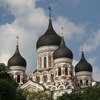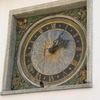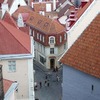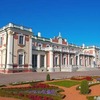Tallinn weathering the stag party storm
When Sankha Guha wrote a guide to Estonia's capital in 2002 he feared for its future as another cheap stop on the stag-party circuit. But the city has coped admirably with the invasion - in fact, it has prospered and endured
By Sankha Guha
24 April 2006
Journalists, bless us, are prone to the odd bout of hubris. John Simpson had his mad moment when he suggested that he had personally liberated Kabul following the dispatch of the Taliban. My Simpson moment occurred in Tallinn, when I told viewers of the BBC's Holiday programme that they had my permission to come to the city I had discovered, but only if they behaved themselves. I had taken it upon myself to become the knight protector of Estonia's capital city.
My presumption derived from a guidebook I produced back in 2002 a prelapsarian era which should be denoted by the initials BE Before easyJet. In my book I observed that Tallinn was similar to Prague in that they both have a miraculously preserved medieval centre. But Tallinn is much, much smaller a "pocket-sized Prague" was my clever summa. It followed that if the Czech city could be ruined by stag-party tourism, Tallinn would fall to the vandals and chavigoths of England so much more easily. I felt protective towards my fiefdom.
EasyJet began its service to Tallinn in November 2004 there and back from around 75. Inevitably a substantial proportion of its cargo consists of exclusively male groups. Their weekend in the city is generally a sorry progression through obligatory "Irish" pubs with folksy names in the vein of Molly O'Flaherty's Knickers or Father McGinty's Reindeer and, once tanked up, on to a succession of stripclubs and/or casinos.
There is no shortage of web-based travel operators catering to the low common denominators bigweekends.com offers a "guaranteed to pull in Tallinn" package for 159 per person. Exactly what punters might pull is not specified though it seems likely to be the muscle that controls the vomiting reflex.
This is my first return in 18 months, and I fear the worst when I see a group of male fellow-passengers in the baggage hall ogling low-rent glamour girls and Bond-like smarmies on advertising posters for local casinos. First impressions suggest we have indeed arrived in the Costa del Baltic.
Amazingly though, Tallinn endures. It does more than that it prospers. It is clear, throughout my weekend, that the city has steered a path through the honey- traps of mal-development tiny Tallinn has by luck or design absorbed the worst of the tourist invasion and simply diverted the stag traffic into ghettos.
The guidebook I wrote four years ago is about another city long demised. Bars, clubs and restaurants have open and shut. In some cases the same establishments have been revamped and relaunched two or three times over. Much of the city is a building site. Landmarks have disappeared and others have risen.
Viru Square, once a bus terminus, has metamorphosed into a shopping mall with the usual brand suspects: Body Shop, Zara, Esprit, Diesel and Sergio Tacchini are in the house. In other words, Tallinn is beginning to look like everywhere else.
The mall offers access to the Soviet-era Kaubamaja (with admirable precision the word means "department store"). It was the first and only department store in town when it opened in 1960. Just four years ago it was still staffed by hatchet-faced babushkas and goods were shovelled on to the sales floor with all the appeal of a jumble sale. My friend Gea remembers the shoe department typically devoting an entire wall to one design and a fruit and veg section that never stocked exotica like bananas.
Kaubamaja has undergone not so much a makeover as a paradigm shift. Whatever the Communist department store represented, this is the opposite. A trendy new logo K within a circle primes you for what is to come. Chanel, Armani, Dior and Lancme beckon seductively from extravagant displays. Personal shopping is available to "men who evaluate their time very much". Gea recently showed off the transformed store to her granny: "I took her there and she said: 'Thank you very much, I have been to a foreign country now'." And, yes, they do have bananas.
Imported goods are expensive for locals, but somebody must be buying. Drooling bankers talk about GDP growth of 9.1 per cent last year and investment is pouring in. In the race for modernity the country is outstripping the West, earning it the sobriquet e-Stonia; 90 per cent of the population are on the internet, 95 per cent of all bank transactions are online and virtually every caf worth the name in Tallinn offers free wi-fi access to customers.
At a beachside pub in Viimsi, about 15km from the centre of Tallinn, the brunch conversation takes an obsessive turn. Voices are tinged with disbelief and wonder. Outside, the chill Baltic wind whips in from the Gulf of Finland, but the skies are preternaturally blue from horizon to horizon; the outlook is dazzlingly sunny.
Olga reckons her flat in the chi-chi locality of Kadriorg has tripled in value in the past five years, half the increase having come in the last year. Gea concurs: "We bought our flat for Ekr865,000 (38,000) in January last year. The apartment would now cost 1.5m (66,000)." This is the kind of conversation I used to come to Tallinn to escape.
My friends are coming to terms with the property boom that has exploded around them a conversation like this was inconceivable when I was last in town. Then there was a slightly sullen recognition that foreigners were buying up chunks of the pretty Old Town and doing well. But Estonians never thought such capitalist magic could sprinkle fairy dust on them. Now they bore on about property inflation like Londoners used to.
The pub called Paat which means boat, at Rohuneeme tee 53 (00 372 6 090 840; paat.ee) is a sign of the times. It stands on the foreshore, and is a playful architectural take on an upside-down fishing boat. Built five years ago and designed by Estonians, the pub is an example of the rush for the new and the whimsical. It is a cipher for the emphatically post-Soviet mood of the country.
Across the brunch table Olga Makina, a statuesque 6ft former model turned photographer, feels the country is engaging in a form of selective amnesia. As one of the country's sizeable Russian minority, she is well placed to chart Estonia's flight from the East. "Soviet-style Tallinn is being erased. The Estonians hated it so much," she says. "It is frustrating. In England there are buildings that come from different periods of history. Here everything is new. Our recent heritage is not valued at all."
The disdain for all things Soviet is evident at the neglected Maarjamae war memorial by the side of the coastal road back into town. Built in 1975 to commemorate "Fighters For Soviet Power" the bombastic scale of the monument reeks of totalitarianism. It may not be loved, but it is evocative. The weeds pushing through the gigantic crossed walkways, the chipped, cracked and absent concrete tiles are witness to the changing times. This crass statement of domination has become something more elegiac a monument to the fragility of power.
Tallinn's older heritage is still there silhouetted against the lengthening sunset across the bay. The bristling missile outlines of Lutheran spires, chunky medieval towers and the distinctive onion domes of the orthodox Nevski Cathedral that rise from the corona of the Old Town are all familiar and accounted for.
After dark the stag parties sway between pubs in the Old Town; those that will have them. The management of the achingly stylish Pegasus (Harju 1 t: +372 631 40 40; restoranpegasus.ee) and likewise down the street at the fashionable bar Kaheksa, at Vana-Posti 8 (00 372 627 4770) have had enough and shut their doors to groups of staggering males with British accents.
Estonians occupy a parallel universe within the same mini-city centre. The action tonight I am told in a flurry of SMS is at Von Krahl, at Rataskaevu 10/12 (00 372 626 90 96; vonkrahl .ee). Von Krahl is an institution theatre, bar, music venue and art space. While shiny cocktail bars like the antiseptic Stereo Lounge, at Harju 6 (00 372 631 05 49; stereolounge.ee) spring up in the centre, Von Krahl revels in its unreconstructed grunginess. It is a tourist-free zone and the style is very Esto low key, dress down but oh so knowing.
DJ Raul Saaremets is playing drums with a scratch combo. He sits on a stool, flat cap pulled over his eyes, a fag dripping from his lips the Andy Capp of cool. The band sings in Estonian, and produces an Indie sound that defies both easy listening or easy categorisation.
Later, much later, I find myself in Angel Caf, at Sauna 1 (00 372 641 68 80), an adjunct of the hottest gay club in town. The door policy is not exclusively gay and for the media elite these are the current must-be-seen-at hang-outs.
A less negotiable exclusivity belongs to the larger club that is defined simply by being Estonian. Tonight some Russian girls have signed in. Shaking their booty and dressed like hookers they make like white trash the world over.
Some 40 per cent of this city is Russian, a legacy of the Russification policies of the Soviet era. Immigration from the Soviet Union was encouraged in an attempt to destroy the Estonian claim to nationhood. The immigrants were not welcome then and are becoming an underclass now. They get short shrift from the group of Estonians I'm with: "They must speak Estonian if they want to be part of our country and share the good fortune."
As the night wears on, one of the girls bottle- blonde, micro skirt, spangly top and fishnets attaches herself to our group. She cadges vodka and engages in broken English. She is 23, her ambition is to go to Italy like her friends who make good money there stripping. She demonstrates how sexy her moves are, then slurring, loses the plot: "See this," she says showing off a trim midriff. "I work hard to make this body. I am mother, I have baby, one year and 10 months." She looks fuzzy and tails off: "Cannot go Italy with baby."
As she gets louder my Estonian companions do little to conceal their amusement that shades to contempt. She is sitting across the table having tried to chat up one of the boys; his body language speaks of total rejection. How long can she take this, I wonder. The moment of epiphany comes her eyes are fixed on the table, they mist over and swim with tears. Estonia is having a party and she is not on the guestlist.





